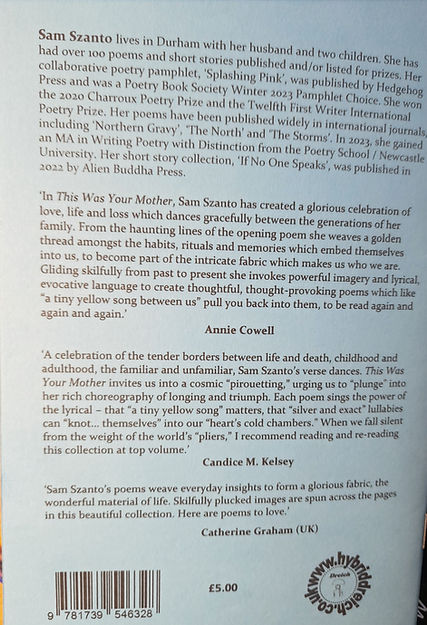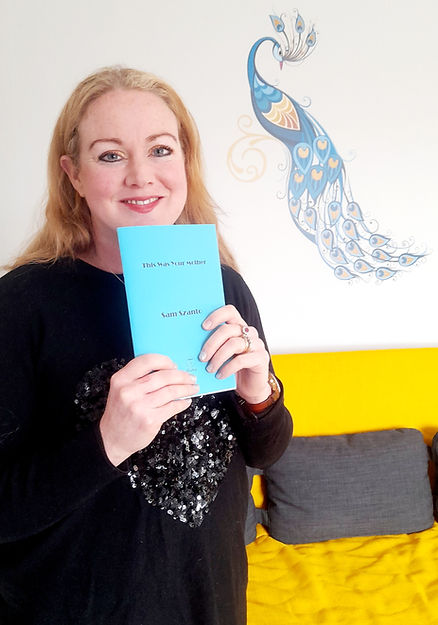Janet Dale & Allison Renner: 'Maybe Fitzgerald would be flattered that we were inspired by his wonderful words'
- samszanto2
- May 4, 2025
- 6 min read

A chat with Janet Dale and Allison Renner about their hybrid chapbook, Green Light: the Gatsby Cycle (Alien Buddha Press, 2025)
How would you describe Green Light: the Gatsby Cycle in one sentence?
A: A loose tribute to a classic with a twist.
J: A project that turned into a collaboration that turned into a chapbook.
Why did you decide to write the book?
J: Well, this story has a beginning. During grad school, I purchased used copies of different books at library sales over a couple summers, including four or five Gatsbys. Inspired by the now-defunct Found Poetry Review, one winter break I grabbed a Gatsby off the shelf and began blacking out lines with a Sharpie. I thought I was going to do the entire book, but Sharpie bleeds through pages and I thought the first page of each chapter was a more manageable project.
A: I joined Jami Attenberg’s 1,000 Words of Summer in 2021 and had to write 1,000 words a day. As a flash fiction writer, I thought it was a great opportunity to write a new story each day. I had a list of ideas and wrote random stories the first four days, but when Janet told me how she did her Gatsby found poetry, I wanted to try something similar, but with flash. So I picked one sentence to use from the first page of each chapter to start as a story. I didn’t intend for them to be one continuous story, but I got engrossed in the idea so they formed that way.

3. How did the collaborative process work?
A: We didn’t work together until it came to putting the book together! I guess you could say it was collaborative in the way that Janet shared her idea? But we both worked independently, and the poems working with the stories was, honestly, a happy accident!

4. How did you structure the book?
A: Chapter 1 poem, Chapter 1 flash. Chapter 2 poem, Chapter 2 flash. Easy peasy! Oh, then Janet formatted it for us and added those cute light bulbs between each poem and flash!
J: It really fit together naturally, despite being written apart.
5. How long did the book take to write?
J: I had a rough draft of half of my chapters/poems by 2015, I think. Some were a bit…different thematically though. Maybe even a bit, erotic? I abandoned the project for a while. I took another pass–working with the text electronically instead of by hand. I had all chapters/poems in the form they are in now a couple years after that–I’m further away from the poems than Allison is from the stories because she didn’t know about the project when I started working on it.
A: I wrote a flash a day from June 4 to 12, 2021. I handwrote them in a notebook before typing them up and cutting them down slightly in the process. We were sending out the manuscript by July 16, 2021, so it came together quickly after the writing process.
J: My process was a lot more piecemeal. If compressed, it probably took a month from start to finish for me.
6. What is it about The Great Gatsby that makes it such an iconic book, do you think?
A: It made an impact with me because of the beautiful language. After struggling with a lot of dry, bland required reading in high school, this book felt like it cracked my mind wide open. Each time I re-read it, I feel like I catch something different. And the fact that there are so many tributes, retellings, and interpretations shows that everyone else sees a lot in it, too.
J: Since I’ve read so many tributes and listened to so many podcasts discussing it lately, this is hard to answer without parroting others. It’s simple enough to be understood by many, there is a layer of complexity under the surface for those who want to find it–AND IT IS JUST SO BEAUTIFULLY WRITTEN.

7. What do you think F. Scott Fitzgerald would say about your tribute?
J: Honestly? I don’t think he’d read it–or anything like that–not to say he’s a horrible person. Maybe he’d be curious about what we did, or our process. Maybe Fitzgerald would be flattered that we were inspired by his wonderful words.
A: I can’t imagine him being aware of it but if it somehow got into his hands and he read it, I think he’d have the same reaction as my dad: “It’s depressing.”
J: Depressing is really Fitzgerald’s thing though, so the highest compliment.
8. One of the things I like about your book is that it takes concepts and themes –
loss; reimaging yourself as someone new – as well as symbols, such as the ash,
from The Great Gatsby but doesn’t stick too closely to the text, so you have made
something almost completely new in the same way that Gatsby makes himself
someone almost completely new. Did you think of what you were doing in this
way? Was it ever tempting to work in closer proximity to the text; i.e., imagining
what Nick or Daisy do next?
A: I actually read a lot of retellings and imaginings of the book through different lenses once our book was accepted, and it made me want to come back to the content again and see what I could make happen. But I do like how we used the text for what it is and then put our own spin on things, either finding poems inside the words or using a sentence to create something completely new.
J: Since I was only working with the first page of each chapter I was focused on Fitzgerald’s beautiful prose and how those words made me feel versus the story itself. I know the book well and have seen film adaptations more than once, of course, and I have thoughts about the characters, for sure.
Allison, do you remember that book you recently saw written by a ‘Daisy Buchanan?’
A: I was at novel., an independent bookstore in Memphis, and saw a book by Daisy Buchanan. I laughed and sent a pic to Janet and then realized… it could have actually been written by her! Read Yourself Happy: How to Use Books to Ease Your Anxiety by Daisy Buchanan.
9. How did you choose a publisher?
J: Allison found Alien Buddha Press and it was one of the presses where we submitted Green Light. The publisher was interested in the work, but because he had never published a collaborative book before he had to pass on it. Instead, we submitted individual manuscripts to ABP and we each accepted and published chapbooks in fall of 2022.
A: We started sending this out in July 2021 and were looking for small presses that either had a unique approach (hand-bound books, limited runs, etc) and then realized we might need to seek places that had published co-authored works before. We sent it to 9 publishers total, coming back to Alien Buddha Press after working with the publisher individually. We knew we wanted to capitalize on the 100th anniversary of The Great Gatsby so time was of the essence!
10. How have people responded to the book so far?
A: As I mentioned before, my dad said it was depressing, which is just a fact, honestly, but I took it as a compliment.
J: Excitement. They want to see what we’ve done with the original and are just curious as to how found poetry and flash fiction can work together.
11. Do you have any other writing plans in the pipeline, separately or together?
J: Allison and I do have a found piece we collaborated on looking for a home. Personally, my own writing has been in the ‘valley of ashes,’ so to speak. I’m going to mix literary references and say that I hope to ‘rise from the ashes’ over the summer with new material.
A: I have about six ideas for collections or novellas in flash in various stages, including one that I should send out after getting some rejections, two with a few pieces written, and the rest just as ideas floating around in my mind.
12. Have you any readings or other events planned to promote the book?
J: Weeks before it was published, we began a full promotional schedule spearheaded by Allison that included our own ads recreated from real 1925 Gatsby ads and Taylor Swift as our book cover. We have written about or reviewed Gatsby/Fitzgerald-related merch, books, and stories separately.
Right now we have a forthcoming interview with Pine Hills Review and we will be recording an episode of a BookSquadGoals podcast in July.
Buy Green Light: the Gatsby Cycle here:

Allison Renner’s fiction and photography have appeared in South Florida Poetry Journal, Briefly Write, Ellipsis Zine, Six Sentences, Rejection Letters, Atlas and Alice, Misery Tourism, FERAL, and vulnerary magazine. Her chapbook, Won’t Be By Your Side, is out from Alien Buddha Press. She can be found online at allisonrennerwrites.com.
Nominated for the Pushcart Prize and Best of the Net, Janet Dale’s work has appeared in The Boiler, Pine Hills Review, Zone 3, and others. Her poetry chapbook, ghosts passing through, is available from Alien Buddha Press. She teaches composition, creative writing, and literature at Georgia Southern University.







Comments